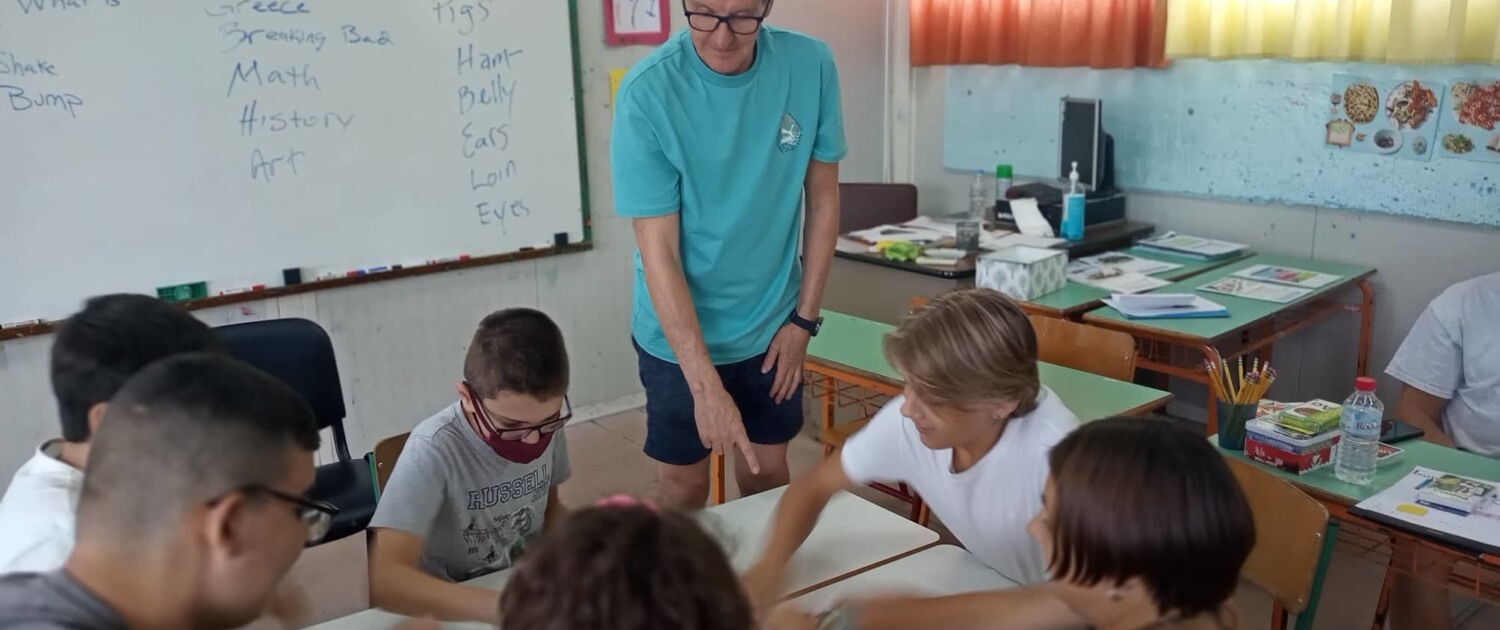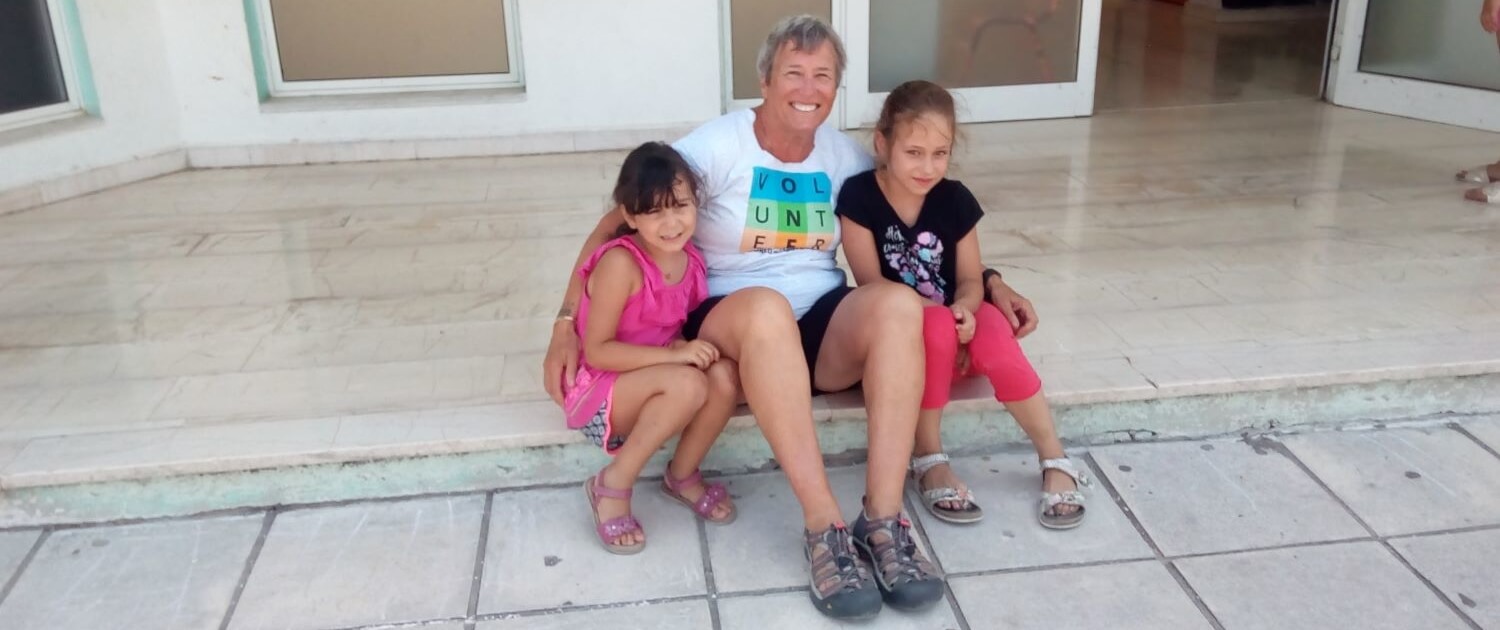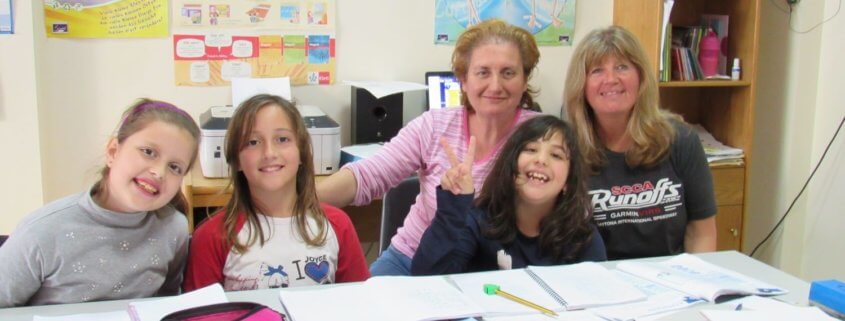Building Local Capacity in Greece
In every case, volunteers are catalysts for lasting change on genuine development projects. Because our inspired community partners have the vision and local support to direct volunteer projects, individuals, families, and groups are the “helping hands” for long-term success – whether teaching English, planting container gardens, providing health care, teaching in the classroom, painting a classroom, or counseling pregnant women. The goal always is to support local capacity. This third post in a series features Greece Country Manager Sam Pinakoulaki, who reflects on her 17 years leading and observing volunteers in action as catalysts of change.
What are the main projects for our community partners in Greece?
In working toward the well-being of its people, the municipality of Malevizi, Crete, seeks to provide a quality education that will allow children to both be able to find a job in Greece as well as to continue their studies in the European Union. Tourism is one of the most important industries in Greece, especially in Crete, and English is the dominant language of instruction in the European Union. Therefore, English education is essential for the educational efforts of the municipality of Malevizi and schools in the district. Similarly, the Women’s Association of Heraklion, Crete, works towards the well-being of abused women and children. Their work includes the provision of education and English classes.
How have you observed Global Volunteers’ work with those partners improve community members’ lives in the long run?
English has become the language of commerce, technology and opportunity worldwide and the International expression of peace, friendship and respect. The economy of Crete used to rely on farming and stock breeding as their main productive activities until the late 70s. But tourism has since become prominent. The excellent climate of the island and the beautiful landscape, along with the remarkable tourist resorts, attract as many as 3,000,000 visitors every year. Today, there is still an emphasis on farming and stock breeding (exporting to both mainland Greece and across the globe) and in the services industry. Cretans who wish to work in one of the three sectors of the Cretan economy today require a good knowledge of the English language to avoid being among the unemployed on the island.
In practice, certifying that a Greek national speaks English usually requires international certification. International English examinations such as the TOEFL and the Michigan English tests provide this certification, and the latter exam is especially popular in Greece. Global Volunteers Community Partner Malamo “Tenia” Vigla, an English teacher herself, explains the importance of Global Volunteer’s support in the achievement of certification by her students; “You see, the exam is broken down into four parts: listening, writing, grammar/vocabulary, and speaking. Examiners from the U.S. fly to Greece to test the children, so you can imagine for many Greek children, this is the first time they converse with a native English speaker. My students, however, have an added advantage. Working with Global Volunteers gives my students a chance to practice their conversational English skills by speaking with volunteer teachers about Greek culture, history, and philosophy. It’s a win-win situation. It’s not surprising all my students do well and with stunning results!”

How does a steady stream of volunteers support these projects?
Global Volunteers assists the community partners and their community members in Greece with two different conversational English work projects:
- During the spring and autumn in after-school language schools:
Since the country is recovering from a crippling economic recession, teachers yearn to teach their students the language of commerce, technology, and opportunity. When they reach adulthood, young men and women must rely on their command of English to help secure their country’s place on the global stage. After-school language schools allow students to gain knowledge and pass the various required certification in the English language. Under the guidance of the local teachers, volunteers assist at these schools following a curriculum. They also create “mock’ oral exams helping students advance their skills in conversational English. In some cases, volunteers also help advanced students with their CVs and cover letters.
- During the summer months of June- August, at the Global Volunteers summer school program:
Global Volunteers runs an English summer school program in a local elementary school during the summer months. Students from all over the county attend. Volunteers create lesson plans and teach conversational English for four hours each morning, Monday through Friday. Volunteer’s team teaches a wide variety of lessons (all in English) using pictures from home, texts, stories and anything creative to make English fun, such as worksheets, color by numbers, arts & crafts projects, stories, songs and outdoor games and activities.

What do Global Volunteers add to the curriculum or experience for students in the classrooms that can’t be provided any other way?
English is taught in regular schools from 2nd-grade elementary school; however, the curriculum is very basic and not good enough to gain a certificate in English. So children need to attend extra English lessons in one of the many language schools across Greece. Many of the lessons taught in these schools are by Greek teachers, so the opportunity for the children to converse with native-speaking volunteers is a huge asset for them. They gain experience, learn the different dialects, and enjoy learning about another culture. What’s interesting is that the five schools we work in each year all have a 100% successful pass rate for their students compared to other schools that don’t host volunteers.
As for the summer school, the volunteer’s presence and the friendships made encourage the youngest of learners (age 5) to fall in love with the language and excel at an early age. They also pick up some valuable language skills without realizing it because summer school is flexible, not tied to a specific curriculum, and it’s fun! Older kids can talk openly and freely and, in many cases, meet volunteers from the vocation they wish to follow.
Do you believe the volunteers can support local sustainability/self-sufficiency without creating dependency? Is it a delicate balance?
I definitely do believe the volunteers offer just the right amount of support and offer a unique, additive value. While in the country, volunteers share with both the collaborating teachers and the students unique tips and best practices that can be and still are used after they leave. This is the essence of investing in self-sufficiency. We observed that most dramatically during the pandemic, when volunteers could not work with students for an entire school year. Yet, these were the skills they left with the students they worked with in preceding years:
- How to read confidently,
- How to listen attentively,
- How to speak (slowly, clearly)
- Grammatical correctness
- Broader vocabulary
- Essay/email pointers
The goal of Global Volunteers’ work is not to make students or teachers dependent on our support but rather to provide them with sufficient knowledge of the English Language and teaching practices to keep learning and teaching others on their own. We don’t seek to replace local teachers. We seek to strengthen their local capacity. This support and mutual learning are described by one of our long-term teacher-partners; “As for me, I learn a lot from the volunteers, too. I get the chance to share my culture and the history of Crete with them and pick up interesting teaching ideas from them, too.”
In this way, English skills are the building blocks, and our volunteers help students – and teachers – assemble them into a structure of their choosing.
Read previous capacity-building posts:




Leave a Reply
Want to join the discussion?Feel free to contribute!